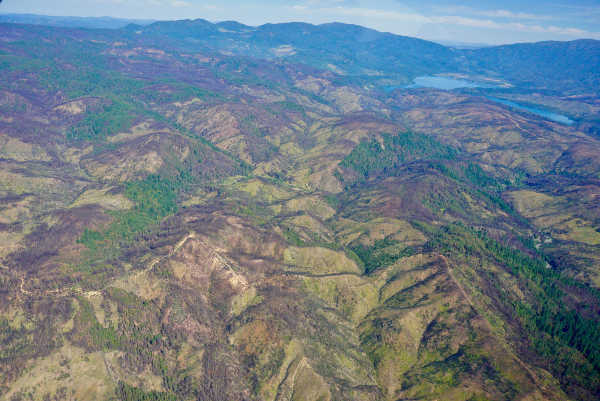
NORTHERN CALIFORNIA – An environmental group has filed suit over timber sales on the Mendocino National Forest in the wake of the Ranch fire.
The Environmental Protection Information Center, or EPIC, is suing the U.S. Forest Service for approving a series of timber sales on the Mendocino National Forest that shortcut public participation and environmental review in violation of federal law.
In a complaint filed Wednesday, EPIC alleges that the Forest Service expedited seven timber sales, totaling up to 7,000 acres, by mislabeling the logging as a “road maintenance” project. At risk from the logging are clean water, northern spotted owls, and increased fuel conditions.
Mendocino National Forest spokesperson Sandra Moore said she had no comment on the pending litigation.
All Forest Service timber sales are subject to the National Environmental Policy Act, or NEPA. The core of NEPA is a requirement that agencies take a “hard look” at the environmental impacts of their proposed actions, typically done through an environmental impact statement or
environmental analysis.
EPIC alleges that the timber sales were approved using what is called a “categorical exclusion.” Categorical exclusions do not require environmental impact review or public comment.
Here, the Forest Service argues that a commercial timber sale is “road maintenance” because the logging would remove dead and live trees affected by the 2018 Ranch fire along roads, reducing the odds that the trees may fall and block the road.
A separate categorical exclusion exists for post-fire logging, although that is limited to 250 acres, as anything larger in scale is assumed to be able to produce significant impacts to the environment.
All timber sales in this proposed project are larger than 250 acres and many of the roads proposed for logging are closed to motor vehicle use.
“The Mendocino National Forest is taking a page from Trump’s playbook,” said Tom Wheeler, executive director of EPIC. “Calling a timber sale ‘road maintenance’ is a stunning way to stifle public participation and ignore environmental impacts.”
Science has widely recognized that post-fire logging is especially impactful, as logging adds an additional disturbance on top of the effects of the fire.
EPIC said post-fire logging often results in degraded water quality, the spread of invasive plants, and loss of habitat for rare, threatened and endangered species. It can also increase the risk of high-severity fire since logging leaves behind a buildup of slash and finer “fuels.”
If allowed to use a categorical exclusion instead of an environmental impact statement, these impacts may never be adequately examined and mitigation measures to reduce harm through better project design would not be incorporated, EPIC said.
“This is a massive project covering thousands of acres,” said EPIC’s Public Land Advocate Kimberly Baker. “The Mendocino National Forest is breaking the law to meet timber targets and benefit timber corporations at a cost to fragile post-fire watersheds and threatened species. Public safety could be achieved in a more benign manner.”
EPIC is represented by René Voss of Natural Resources Law and Matt Kenna of Public Interest Environmental Law.
The case will be heard in the Northern District Court of California.

 How to resolve AdBlock issue?
How to resolve AdBlock issue? 





